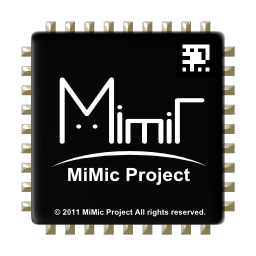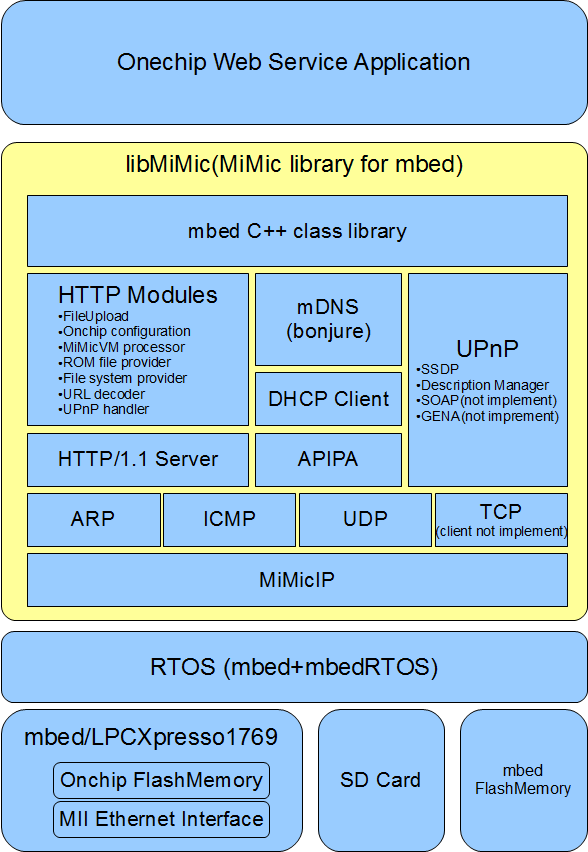This is Webservice SDK for mbed. LPCXpresso1769/LPC1768/FRDM-K64F/LPC4088
Dependents: MbedFileServer_1768MiniDK2 RedWireBridge IssueDebug_gcc MiMicRemoteMCU-for-Mbed ... more

libMiMic(MiMic library for mbed)は、WebService機能を提供するSDKです。 mbedでWebAPIに対応したネットワークデバイスを簡単に作ることが出来ます。
libMiMicはMiMic projectで開発しています。MiMic projectについてはこちらをご覧ください。 http://nyatla.jp/mimic/wp/
構成
libMiMicはmbedRTOS上で動作し、ユーザアプリケーションにAPIを提供します。コアAPIはC言語で記述されていますが、使用頻度の高いものについてはmbed向けのC++APIが準備されています。

※libMiMicはmbedの標準イーサネットドライバをしようしていません。
標準イーサネットドライバと同時に使用することはできません。
- MiMicIP - IPv4スタックです。レテンシとメモリ消費量を抑えたuipベースのライブラリです。
- ARP/ICMP/UDP/TCP - 基礎的なソケットAPIを提供します。APIは独自です。
- HTTP/1.1 Server - HTTP/1.1に対応したサーバです。マルチセッション・Chunked・持続性接続に対応しています。
- HTTP Modules - HTTP/1.1の機能モジュールです。以下のモジュールがあります。
- ROM file provider - ROMに格納したファイルイメージを公開します。
- File system provider - mbedファイルシステムを公開します。
- Onchip configuration - プログラムフラッシュを利用して設定を保存します。
- MiMicVM processor - RPCリクエスト(MiMicVM)を処理します。
- FileUpload - ファイルアップロードを受け取ります。
- URL decoder - HTTPリクエストを解析します。
- UPnP handler -UPnPメッセージを処理します。
- WebSocket - Websocketサーバです。
- mDNS - マルチキャストDNSサービスです。
- UPnP - UPnP/1.0の機能を提供します。UPnP handlerと協調して動作します。(現在はデバイス探索(SSDP)・デスクリプション(Description)のみ実装してあります。)
- DHCP/APIPA - ゼロコンフィギュレーション用のモジュールです。
- HTTP/1.1 Client
- mbed C++ class library - mbed向けのC++CPIです。C言語のものより簡単です。
対応機種
- mbed(mbed LPC1768)
- LPCXpresso1769
プログラム
Import programMiMicRemoteMCU-for-Mbed
MiMic RemoteMCU for mbed. This program provides MCU control API over REST API. It can control MCU from Javascript,PHP or any HTTP rest client directly. And, The application has self development environment.
Import programMbedFileServer
The program publishes files at local directory and SD filesystem. It is a full-fledged webServer somewhat.
サンプル
Import programMiMicSimpleHttpd
This is a simplest HTTP server made of libMiMic. It will echo back a request path.
Import programUPnPBasicDevice
Simplest UPnP basic device example. This program to run UPnP basic device on the mbed.
Import programWebSocketSample
MiMicSDK Websocket module sample program.
Import programHttpClientSamlpe
A http client sample program.
Import programTcpSocketClientSamlpe
MiMicSDK Tcp client socket sample program.
Import programUdpSocketSamlpe
Udp socket sample program. This program will send back the received packet.
チュートリアル
- HTTPD解説
- UPnPデバイスの作り方
- MiMicRemoteMCUの紹介(pdf)
- MiMicRemoteMCUのマニュアル(pdf)
English
libMiMic(MiMic library for mbed) is SDK which provides Webservice functions. It can be created networking device easily using mbed.
See more MiMic information, See MiMic project website. http://nyatla.jp/mimic/wp/
Structure
libMiMic run on mbed RTOS and provides networking API to user application. This library has C++ class API for the mbed, and low-level C language API.

For WebService general, it can be written in a simple C + + API.
libMiMic does not have the standard Ethernet driver of mbed. It is not possible that will be used with the standard Ethernet driver.
- MiMicIP - IPv4 protocol stack. This is based uip which is reduced memory and latency.
- ARP / ICMP / UDP / TCP - Those are provide basic IP protocols.
- HTTP/1.1 Server - The Http server compatible HTTP/1.1. It supports multi-session, chunked transport, persistent connection.
- HTTP Modules - There are addon-module for HTTP server. The following modules.
- ROM file module - Publish the file images in ROM.
- File system module - Publish thefiles in mbed file system.
- Onchip configuration module - To save the network settings to the program flash via REST.
- MiMicVM module - To handle the (MiMicVM) RPC request.
- FileUpload module - Accept a file via HTTP POST.
- URL dedoce module - A versatility URL decoder.
- UPnP handle module - To handle UPnP messages.
- UPnP - This provides UPnP/1.0 device functions. It works together with UPnP handler.
- Websocket - websocket (version13) server
- mDNS Service - DNS-SD protocol server.
- UPnP - This provides UPnP/1.0 device functions which works with UPnP handler. (You have been implemented (SSDP) ? description only (Description) device search now.) It is a module zero configuration for - DHCP / APIPA. mbed C + + class library - C of mbed for + + is the CPI. It is simple than that of the C language.
- DHCP/APIPA - It support zero-cpnfigulation.
- mbed C++ class library. Almost APIs for Web applications are available.
- HTTP/1.1 Client
Supported target
- mbed(mbed LPC1768)
- LPCXpresso1769
Application
Import programMiMicRemoteMCU-for-Mbed
MiMic RemoteMCU for mbed. This program provides MCU control API over REST API. It can control MCU from Javascript,PHP or any HTTP rest client directly. And, The application has self development environment.
Import programMbedFileServer
The program publishes files at local directory and SD filesystem. It is a full-fledged webServer somewhat.
Sample
Import programMiMicSimpleHttpd
This is a simplest HTTP server made of libMiMic. It will echo back a request path.
Import programUPnPBasicDevice
Simplest UPnP basic device example. This program to run UPnP basic device on the mbed.
Import programWebSocketSample
MiMicSDK Websocket module sample program.
Import programHttpClientSamlpe
A http client sample program.
Import programTcpSocketClientSamlpe
MiMicSDK Tcp client socket sample program.
Import programUdpSocketSamlpe
Udp socket sample program. This program will send back the received packet.
Tutorial
- HTTPD hello world.
- How to make own UPnP device.
- MiMicRemoteMCUの紹介(pdf)
- MiMicRemoteMCUのマニュアル(pdf)
core/driver/ethernet/NyLPC_cEthernetMM.c
- Committer:
- nyatla
- Date:
- 2014-05-29
- Revision:
- 69:8c5f220441f5
- Parent:
- 68:f7def7eb5504
- Child:
- 91:db8279c869d3
File content as of revision 69:8c5f220441f5:
#include "NyLPC_cEthernetMM.h"
/**
* メモリブロックの数
*/
#define NUM_OF_MAX_BUF 3
#define NUM_OF_512_BUF 3
#define NUM_OF_256_BUF 4
#define NUM_OF_128_BUF 16
#define NUM_OF_64_BUF 4
/**
* FULLサイズのEthernetFrame送信メモリのサイズ。
* ここで最大送信サイズを制限する。
* 通常は1460+20+20+14=1514バイト
*/
#define MAX_TX_ETHERNET_FRAME_SIZE 1514
/**
* TXメモリブロックの配置
* 9518バイト
*/
struct TTxMemoryBlock
{
struct{
struct NyLPC_TTxBufferHeader h;
NyLPC_TUInt8 b[MAX_TX_ETHERNET_FRAME_SIZE];
}buf_max[NUM_OF_MAX_BUF];//(4+MAX_TX_ETHERNET_FRAME_SIZE(1514))*3=? default=4554
struct{
struct NyLPC_TTxBufferHeader h;
NyLPC_TUInt8 b[512];
}buf_512[NUM_OF_512_BUF];//(4+512)*3=1548
struct{
struct NyLPC_TTxBufferHeader h;
NyLPC_TUInt8 b[256];
}buf_256[NUM_OF_256_BUF];//(4+256)*4=1560
struct{
struct NyLPC_TTxBufferHeader h;
NyLPC_TUInt8 b[128];
}buf_128[NUM_OF_128_BUF];//(4+128)*16=1584
struct{
struct NyLPC_TTxBufferHeader h;
NyLPC_TUInt8 b[64];
}buf_64[NUM_OF_64_BUF];//(4+64)*4=272
};
/**
* メモリブロックの配置
*/
static struct TTxMemoryBlock* _mem_addr;
/**
* デバック用。使用中のTxブロックの数を返す。
*/
int NyLPC_cEthernetMM_dbg_getNumofUsedTx(void)
{
int x;
NyLPC_TUInt8 r1,r2,r3,r4,r5;
r1=r2=r3=r4=r5=0;
for(x=0;x<NUM_OF_MAX_BUF;x++){
if(_mem_addr->buf_max[x].h.is_lock || _mem_addr->buf_max[x].h.ref>0){
r1++;
continue;
}
}
for(x=0;x<NUM_OF_512_BUF;x++){
if(_mem_addr->buf_512[x].h.is_lock || _mem_addr->buf_512[x].h.ref>0){
r2++;
continue;
}
}
for(x=0;x<NUM_OF_256_BUF;x++){
if(_mem_addr->buf_256[x].h.is_lock || _mem_addr->buf_256[x].h.ref>0){
r3++;
continue;
}
}
for(x=0;x<NUM_OF_128_BUF;x++){
if(_mem_addr->buf_128[x].h.is_lock || _mem_addr->buf_128[x].h.ref>0){
r4++;
continue;
}
}
for(x=0;x<NUM_OF_64_BUF;x++){
if(_mem_addr->buf_64[x].h.is_lock || _mem_addr->buf_64[x].h.ref>0){
r5++;
continue;
}
}
return r1+r2+r3+r4+r5;
}
void NyLPC_cEthernetMM_initialize(void* i_memblock_addr)
{
int x;
_mem_addr=i_memblock_addr;
//TXバッファを初期化
for(x=0;x<NUM_OF_MAX_BUF;x++){
_mem_addr->buf_max[x].h.is_lock=NyLPC_TUInt8_FALSE;
_mem_addr->buf_max[x].h.ref=0;
}
for(x=0;x<NUM_OF_512_BUF;x++){
_mem_addr->buf_512[x].h.is_lock=NyLPC_TUInt8_FALSE;
_mem_addr->buf_512[x].h.ref=0;
}
for(x=0;x<NUM_OF_256_BUF;x++){
_mem_addr->buf_256[x].h.is_lock=NyLPC_TUInt8_FALSE;
_mem_addr->buf_256[x].h.ref=0;
}
for(x=0;x<NUM_OF_128_BUF;x++){
_mem_addr->buf_128[x].h.is_lock=NyLPC_TUInt8_FALSE;
_mem_addr->buf_128[x].h.ref=0;
}
for(x=0;x<NUM_OF_64_BUF;x++){
_mem_addr->buf_64[x].h.is_lock=NyLPC_TUInt8_FALSE;
_mem_addr->buf_64[x].h.ref=0;
}
}
/**
* 空のTxバッファのポインタを返します。
*/
struct NyLPC_TTxBufferHeader* NyLPC_cEthernetMM_alloc(NyLPC_TUInt16 i_hint,NyLPC_TUInt16* o_size)
{
int i;
//ヒントから、割り当てるメモリブロックを決定
//特殊ブロック
if(i_hint==NyLPC_TcEthernetMM_HINT_CTRL_PACKET){
for(i=0;i<NUM_OF_64_BUF;i++){
//未参照かつ送信中でないもの。
if(_mem_addr->buf_64[i].h.ref>0 || _mem_addr->buf_64[i].h.is_lock){
continue;
}
_mem_addr->buf_64[i].h.ref++;
*o_size=64;
return &(_mem_addr->buf_64[i].h);
}
return NULL;
}
//汎用ブロック
if(i_hint<=128){
goto ALLOC_128;
}else if(i_hint<=256){
goto ALLOC_256;
}else if(i_hint<=512){
goto ALLOC_512;
}else{
goto ALLOC_MAX;
}
ALLOC_MAX:
for(i=0;i<NUM_OF_MAX_BUF;i++){
//未参照かつ送信中でないもの。
if(_mem_addr->buf_max[i].h.ref>0 || _mem_addr->buf_max[i].h.is_lock){
continue;
}
_mem_addr->buf_max[i].h.ref++;
*o_size=MAX_TX_ETHERNET_FRAME_SIZE;
return &(_mem_addr->buf_max[i].h);
}
ALLOC_512:
for(i=0;i<NUM_OF_512_BUF;i++){
//未参照かつ送信中でないもの。
if(_mem_addr->buf_512[i].h.ref>0 || _mem_addr->buf_512[i].h.is_lock){
continue;
}
*o_size=512;
_mem_addr->buf_512[i].h.ref++;
return &(_mem_addr->buf_512[i].h);
}
ALLOC_256:
for(i=0;i<NUM_OF_256_BUF;i++){
//未参照かつ送信中でないもの。
if(_mem_addr->buf_256[i].h.ref>0 || (_mem_addr->buf_256[i].h.is_lock)){
continue;
}
*o_size=256;
_mem_addr->buf_256[i].h.ref++;
return &(_mem_addr->buf_256[i].h);
}
ALLOC_128:
for(i=0;i<NUM_OF_128_BUF;i++){
//未参照かつ送信中でないもの。
if(_mem_addr->buf_128[i].h.ref>0 || (_mem_addr->buf_128[i].h.is_lock)){
continue;
}
*o_size=128;
_mem_addr->buf_128[i].h.ref++;
return &(_mem_addr->buf_128[i].h);
}
return NULL;
}
void NyLPC_cEthernetMM_release(struct NyLPC_TTxBufferHeader* i_buf)
{
//参照カウンタを1減算
NyLPC_Assert(i_buf->ref>0);
i_buf->ref--;
return;
}

 MiMic Webservice library
MiMic Webservice library